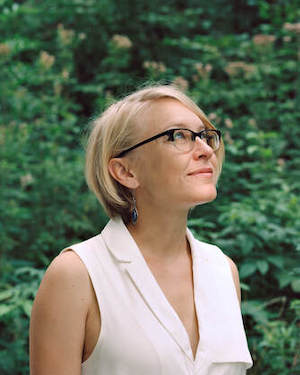By Nathan Kouri
Elisabeth Jaquette (ΦBK, Swarthmore College) first realized the power of translation while running a bilingual book club in Cairo. After finishing a Center for Arabic Study Abroad fellowship at the American University at Cairo, she tried her hand at literary translation from Arabic into English. Only three years later, she published her first translation, The Queue by Basma Abdel Aziz, which was long listed for the 2016 Best Translated Book Award. The Queue is a political satire, and having lived in Cairo during the 2011 Egyptian revolution and its aftermath, Jaquette had a personal connection to the book’s defiant vision.
Since then, Jaquette has translated everything from graphic novels to journalism and diaries. She said in an interview with The Common, “I want English readers to experience something new and to have their conceptions of what a story can do, or how a story should be told, stretched.” She’s also made a point to address inequality in publishing. “The gender disparity in translated literature is well established: according to Chad Post’s calculations on Three Percent, female authors make up 29% of all the translations published over the past ten years. For Arabic, that number is even lower: 23%. I aim to help shift that with my choices as a translator,” Jaquette told the Center for the Art of Translation.
Jaquette’s latest full-length translation, the Palestinian novel Minor Detail by Adania Shibli, was a finalist for the 2020 National Book Award for Translated Literature, and this week it appeared on the longlist for the 2021 International Booker Prize. Like The Queue, Minor Detail is something of a protest novel, and not a subtle one, but its withholding narration and unusual form make Shibli’s provocations not easily simplified.
“It’s probably the work I am most proud to have translated. It was a huge challenge,” Jaquette said of Minor Detail. “Every sentence, every word was very intentional and something [Shibli] had thought about and crafted over the course of a dozen years.”
The novel is split into two roughly equal parts. The first part opens in 1949 in the Negev desert, following an unnamed Israeli military officer as he leads a sweep of the area. The style in this section is pared down, resisting the wealth of detail typical in many historical novels, with a distant intensity that recalls the work of Sonallah Ibrahim or Albert Camus. The second part takes place several decades later, following a Palestinian woman who attempts to gather information on a crime committed by the soldiers in the novel’s first half. Its first-person narrator is self-absorbed and rambling. Part of what drives this narrator is her desire to know history through personal experience rather than in generalized, one-sided summaries. Whereas Minor Detail’s first half is all sensations and events without clear psychology or cause and effect, in the second half such concrete details are swallowed up in a cloud of words as the self-conscious narrator overanalyzes her thoughts and feelings, recounting her story in an anxious, roundabout manner. The two halves are connected stylistically by their use of poetic repetition and by some shared motifs: spider webs, dogs barking, overpowering shivers, and the smell of gasoline.
“As each echo amplifies the next, the overall effect is incredible,” Jaquette explained in an interview with ArabLit Quarterly. “The way Adania lays these two narratives over one another is so powerful; history is right there, yet inaccessible . . . . In the end, I think these echoes create a nearly-invisible architecture beneath the book, more felt than seen.”
In addition to her celebrated translations, Jaquette is the Executive Director of the American Literary Translators Association (ALTA), a nonprofit that supports translators through awards, an emerging translator mentorship program, and an annual conference that’s the largest of its kind. She also belongs to the translators collective Cedilla & Co. Phi Beta Kappa membership underscores for many the importance of intellectual communities, and Jaquette told the Center for the Art of Translation, she sees community as a cornerstone of her practice.
“I think that community is the future of literary translation, and community can take many forms: a collective like Cedilla & Co., a members organization like ALTA, book groups of dedicated readers hosted by independent bookstores,” Jaquette said. “Ultimately what’s been invaluable for me about the group of incredible colleagues is the sharing of knowledge and advice, supporting and advocating for each other, and celebrating each other’s work. Translation is a solitary profession, and I think it’s vitally important to our field to create opportunities for practitioners and advocates to come together in person around this peculiar, compelling art.”
Nathan Kouri earned his bachelor’s degree in English and cinema from the University of Iowa, where he was inducted into Phi Beta Kappa in 2019. The University of Iowa is home to the Alpha of Iowa chapter of Phi Beta Kappa.




